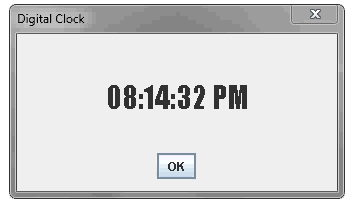Just use a javax.swing.Timer. See how to use Swing Timer
Here's an example. But rather than painting on top-level container like JApplet which you are doing, I'm painting on JPanel which is more recommended

import java.awt.*;
import java.awt.event.*;
import java.text.SimpleDateFormat;
import java.util.Date;
import javax.swing.*;
public class TimerPanel extends JPanel {
private String dateString;
private final SimpleDateFormat format;
private final Font font;
private final Date date;
public TimerPanel() {
format = new SimpleDateFormat("hh:mm:ss a");
font = new Font("impact", Font.PLAIN, 30);
date = new Date();
date.setTime(System.currentTimeMillis());
dateString = format.format(date);
Timer timer = new Timer(1000, new ActionListener() {
@Override
public void actionPerformed(ActionEvent e) {
date.setTime(System.currentTimeMillis());
dateString = format.format(date);
repaint();
}
});
timer.start();
}
@Override
protected void paintComponent(Graphics g) {
super.paintComponent(g);
g.setFont(font);
FontMetrics fm = g.getFontMetrics(font);
int width = fm.stringWidth(dateString);
int height = fm.getAscent();
int x = getWidth() / 2 - width / 2;
int y = getHeight() / 2 + height / 2;
g.drawString(dateString, x, y);
}
@Override
public Dimension getPreferredSize() {
return new Dimension(300, 100);
}
public static void main(String[] args) {
SwingUtilities.invokeLater(new Runnable() {
@Override
public void run() {
TimerPanel timer = new TimerPanel();
JOptionPane.showMessageDialog(
null, timer, "Digital Clock", JOptionPane.PLAIN_MESSAGE);
}
});
}
}
More directly answering your question, your code works when I test it, the only thing you're forgetting to do is call super.paint(). Works as expected after doing so
@Override
public void paint(Graphics g) {
super.paint(g);
You'll want to avoid Thread.sleep though. You may notice this causes flickering. It's preferred to use javax.swing.Timer. That's why I answered with my example first.
与恶龙缠斗过久,自身亦成为恶龙;凝视深渊过久,深渊将回以凝视…
